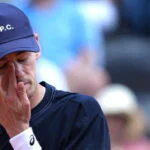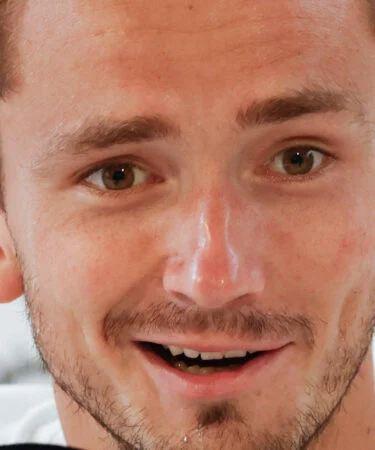“Do we want gladiators into the lion’s den with no feelings?” – interview with Francisca Dauzet about mental toughness
Francisca Dauzet, a psychoanalyst who works with top athletes, tells Tennis Majors she was surprised by the public’s reaction to images of Medvedev at the US Open. Players’ feelings need to be understood, not judged, she says.
 Francisca Dauzet, Daniil Medvedev and Andrey Rublev | © Tennis Majors
Francisca Dauzet, Daniil Medvedev and Andrey Rublev | © Tennis Majors
Tennis Majors: You were interviewed by Eurosport France in the aftermath of Daniil Medvedev’s first-round loss at the US Open, regarding his behavior during the match against Benjamin Bonzi. We learned on that occasion that you were working with him again. Can you explain how that happened?
Francisca Dauzet: It’s not easy to answer this question without being indiscreet about Daniil. I can say that we restarted before the Halle tournament, last June.
Tennis Majors: Let’s talk about these famous images of Daniil and the reactions they sparked. When you see him “heating up” the crowd and taking six minutes from Benjamin Bonzi between two service balls at the time of the first match point, or when he breaks his racket at the end—images that impressed many people—how do you perceive him? I get the impression that you are surprised that people… were surprised or even offended.
Francisca Dauzet: I can say that I am surprised and not at the same time. Because he is not the first and only one to do this kind of thing. Tennis is a sport that provokes this kind of overreaction. Daniil is a bit used to certain mood swings and yes they can be caustic and unwelcome sometimes. His behavior annoys and also affects the public. We remember John McEnroe, for example, in his time who inspired similar feelings… Nevertheless, it seems important to me to clearly distinguish what is being commented on: the match fact about the stoppage, the racket breaking, what he says to the umpire? These are not the same facts. I have the impression that there was an amalgamation and that everything was put on the same level.
Tennis Majors: You cite McEnroe who could have this type of behavior but there were no social networks!
Francisca Dauzet: That’s exactly what I was going to say. In the 1980s, there were no social networks and we were not in the “society of the spectacle” pushed to the extreme that we know today. Today, the public is offended by what they see, and at the same time they love it. It makes them vibrate, it amuses them and at the same time, it causes scandal. It feeds the flow of comments. To answer you “Does it surprise me?” Yes in the sense that the public knows that this kind of event happens with certain situations and certain players. And no because the public does not seem to know – or forgets – what professional players and athletes in all sports, experience as internal tension, linked to multiple and different stakes for each one. It is normal that, during a very long match, emotions of all kinds are expressed and sometimes in an exacerbated way.
Tennis Majors: “Normal”, does that mean that it should be accepted and not provoke a reaction?
Francisca Dauzet: “Normal”, I always have a little trouble with this word that smooths the reading of what is happening and takes away its depth and complexity. What Daniil does is not very politically correct, to say the least. It is not accepted and perhaps it is not acceptable, especially because many players know how to hold back and contain themselves in the face of the same annoyances. In the same way, we could say this on the part of the public who reacts. We therefore see that the exaggerations are present on both sides of the “stage”, one arousing the other and vice versa. But there is no deep malice or intention to harm when this kind of situation happens on the part of the athletes. For players with a great liveliness of mind like Daniil, what happens at that moment is both unconscious and conscious, between non-control and control of what is emerging in space-time. This interruption of the photographer on the court was at the very least impromptu and gave rise to an extrapolation of perceptions. Which leads to an exaggeration of reactions. And, perhaps, creates the situation in which the player can take advantage of the system’s flaws.
A flaw in the rules, a flaw in the behavior of the umpire who lets it happen, a flaw in which the public slips, etc. The player does not take advantage of it coldly. He takes advantage of it in the heat of the action. High-level athletes have a powerful instinct. If they find that things are happening, that they can turn them in their favor, they use them. Who will tell me, among the spectators and people who commented on Daniil’s actions, that it doesn’t happen to them, all things considered, that they too go through moments where they collapse, where they scream, where they feel overwhelmed by emotions or the feeling of wanting to get out of a situation, even exaggeratedly, pushes them to cross certain limits? One of the big differences is that they are not filmed with thousands of spectators all around and that they are not going to be on social networks in an instant. A priori. So knowing what is acceptable is always difficult to determine but judging a part by omitting the impact of the interaction of others, events and the context is, from my point of view, limiting.
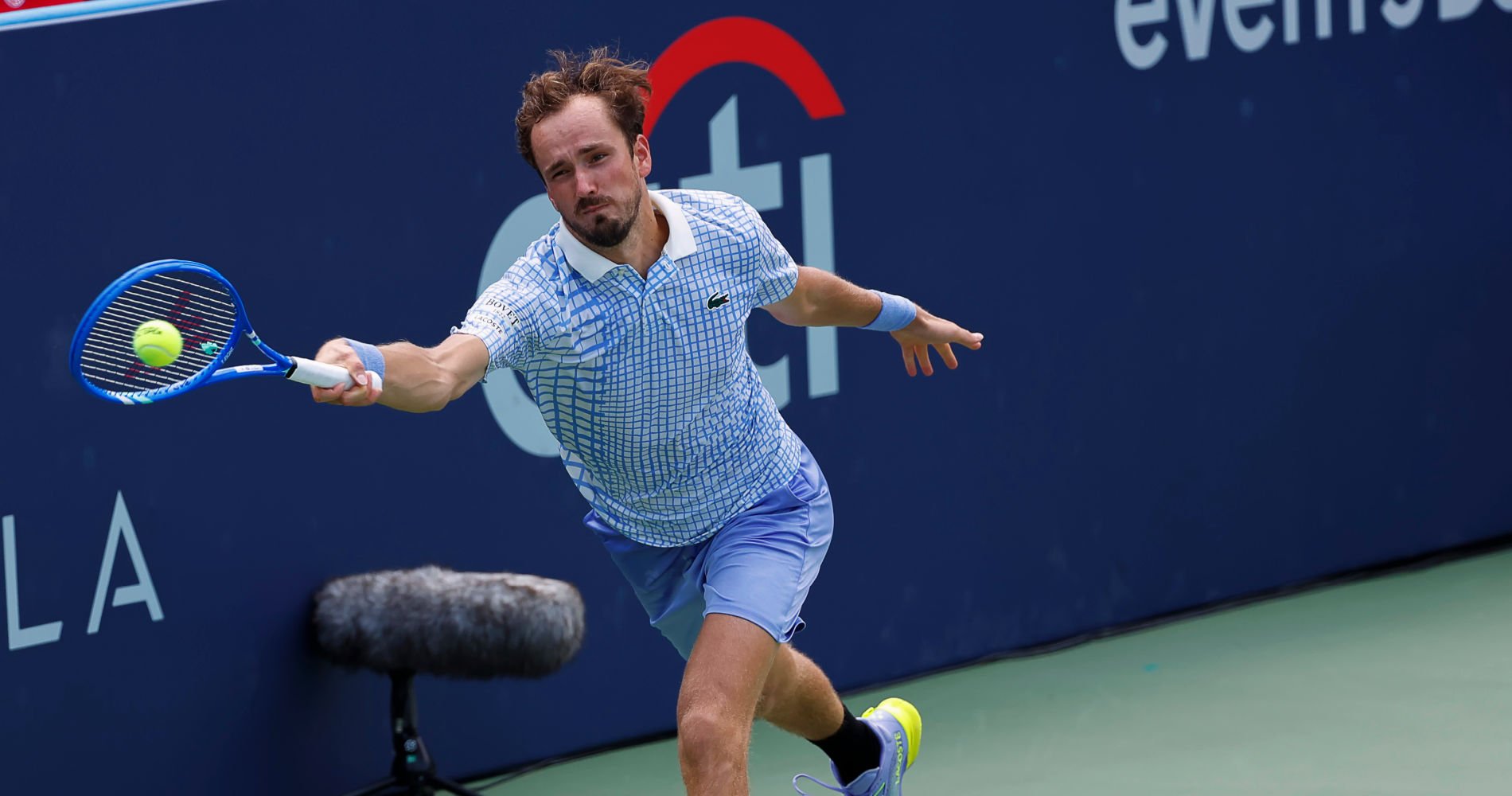
Tennis Majors: If I rephrase what I understand from your answer: after all, nothing in the rules of tennis expressly prohibits playing with the public to protest a decision, and this can be part of an “acceptable” strategy to benefit from a situation like this. Daniil plays with the framework, with the limit, and we have all done it one day, since it is a normal process.
Francisca Dauzet: A normal process, again, I don’t know. A common process, yes. The umpire on the chair is supposed to set the framework and the law in a match. If he imposes himself more, knows how to thwart what is overflowing, maybe it won’t go so far. We see in the images that everyone is subjected to the very strong energy that Daniil gives off at that moment. Everyone seems hypnotized by what he offers in his energy. What emerges from the court during a match constitutes a system in which everyone takes a place, plays a role. The public, the umpire, the players, the teams: all of this forms a system with circulating energy. At one point, Daniil captures everyone’s energy. Sometimes this kind of thing happens but takes a less spectacular turn, so almost no one notices. In the 2021 US Open final for example, Daniil leaves no energy to his opponent. This was previously worked on. Djokovic was like bound hand and foot. Daniil dominated the match on all fronts. Faced with what happened last Sunday, part of the public criticized Daniil, another expressed enthusiasm. It’s a bit like the circus games, the Roman arenas, where at some point, everyone transfers their own personal stakes, convictions, desires onto the player who expresses something strong or onto the player who remains passive. Some raise their thumbs, others lower them, and each takes something of themselves from this situation and projects it.
Some raise their thumbs, others lower them, and each takes something of themselves from this situation and projects it.
Tennis Majors: You just spoke twice about the “society of the spectacle.” Should this expression be understood in the sense given to it by the philosopher Guy Debord in his 1967 essay, which criticized the replacement of social life by a commodified representation of social life?
Francisca Dauzet: Yes, it is a direct reference. Excellent book, which I recommend everyone to read.
Tennis Majors: You say that people’s reactions surprise you, but spectators and observers have the right to have an opinion on what is happening on the field.
Francisca Dauzet: It’s not that people’s reactions surprise me. It’s what I wish to remind them of. There is an important difference between saying: “I don’t like this behavior, this is not my conception of tennis, I like when it’s fair play” etc. or making loaded comments, comments filled with interpretations and intentions, without knowing what is at stake and how. But after all, we can say that it is proportional to the unprecedented nature of the situation.
Tennis Majors: Where, in your eyes, does the legitimate right to share one’s view on what the players offer begin and end?
Francisca Dauzet: What Daniil does is not ideal, but it is a match fact. Can we say about a match fact “what he is doing is horrible, he must be interned”? We suffer from this foul-smelling pressure of social networks where anything is allowed behind one’s screen, behind anonymity, and which sees people say: “Daniil is this, Daniil is that”… They know almost nothing about Daniil, they just have access to a match fact. What I am saying is not a stricto sensu defense of Daniil but rather an invitation for everyone to be more circumspect in their public interventions, when one does not know what or whom one is talking about. In this society of the spectacle, but often in life too, we allow ourselves to comment on anything and everything, without knowing the ins and outs of a subject, without remorse, in a general confusion. It’s always something that has shocked me: these permanent judgments and opinions on everything and anything. Tennis, and sport, do not escape it since at the very high level, it is very exposed. The public, and some professionals who comment, do not know what the player is going through at that moment, do not know what Daniil has or has not worked on himself. Which does not remove the fact that even by working on oneself, one does not become a sage among sages, especially under these pressures.
Tennis Majors: Readers will think you are in defense of Daniil…
Francisca Dauzet: This can concern Sinner, Alcaraz, Djokovic or anyone. I remember an article after the 2021 US Open, where two French shrinks made two contradictory analyses of Djokovic’s character, neither of them knowing him. Most people who talk there do not seem to know what the high-level athlete lives, and even more so in tennis, this sport which is so particular that it exacerbates emotions to the highest point. We have all seen, in our tennis clubs, some doubles matches of old men spin into anything and end up at the club house with a friendly drink. Everyone will have understood that this sport pushes minds into unexpected or also too well-known entrenchments and stakes.
Tennis Majors: And beyond tennis, do you observe these same mechanisms at work, when you work in other fields?
Francisca Dauzet: Of course, the human being is eminently complex. When he is pushed into some of his fundamental limits and fears, his reactions are in response, also depending on what he has been able to work on himself. This same work is done little or rarely or still partially most of the time. Pushing this limit is the daily lot of high-level athletes. And even if they have chosen their path – most often, but not always, it is a repetitive and arduous job to know how to negotiate with the limits.
They know almost nothing about Daniil, they just have access to a match fact.
Tennis Majors: Except no. In tennis, the code of conduct stipulates that even when confronted with your limits, you must control your emotions. If you do what Daniil did, you get a 42,500 euro fine – which is what happened to him. Do the people who enforce these rules understand nothing about what a human being is and, indirectly, are they harming tennis?
Francisca Dauzet: The question is complex. It’s also a question of culture. I’m not talking about national or collective culture, I’m thinking about the system of representation of what competition is. I’m thinking about what high-level sport demands for and from the person we’re talking about. High-level sport, because athletes are public people supposed to be exemplary, would call for the smoothing or control of emotions. Would we therefore expect these competitors to be good little boys, good little girls who will give a lesson in good conduct in front of the cameras? The modality of sport that could produce a so-called exemplary behavior would be leisure sport, social sport, the sport in which one has not too much soiled the pleat of the skirt. But is this the case? No, sport, like many other things, tennis in particular, comes to confront us with some torments.
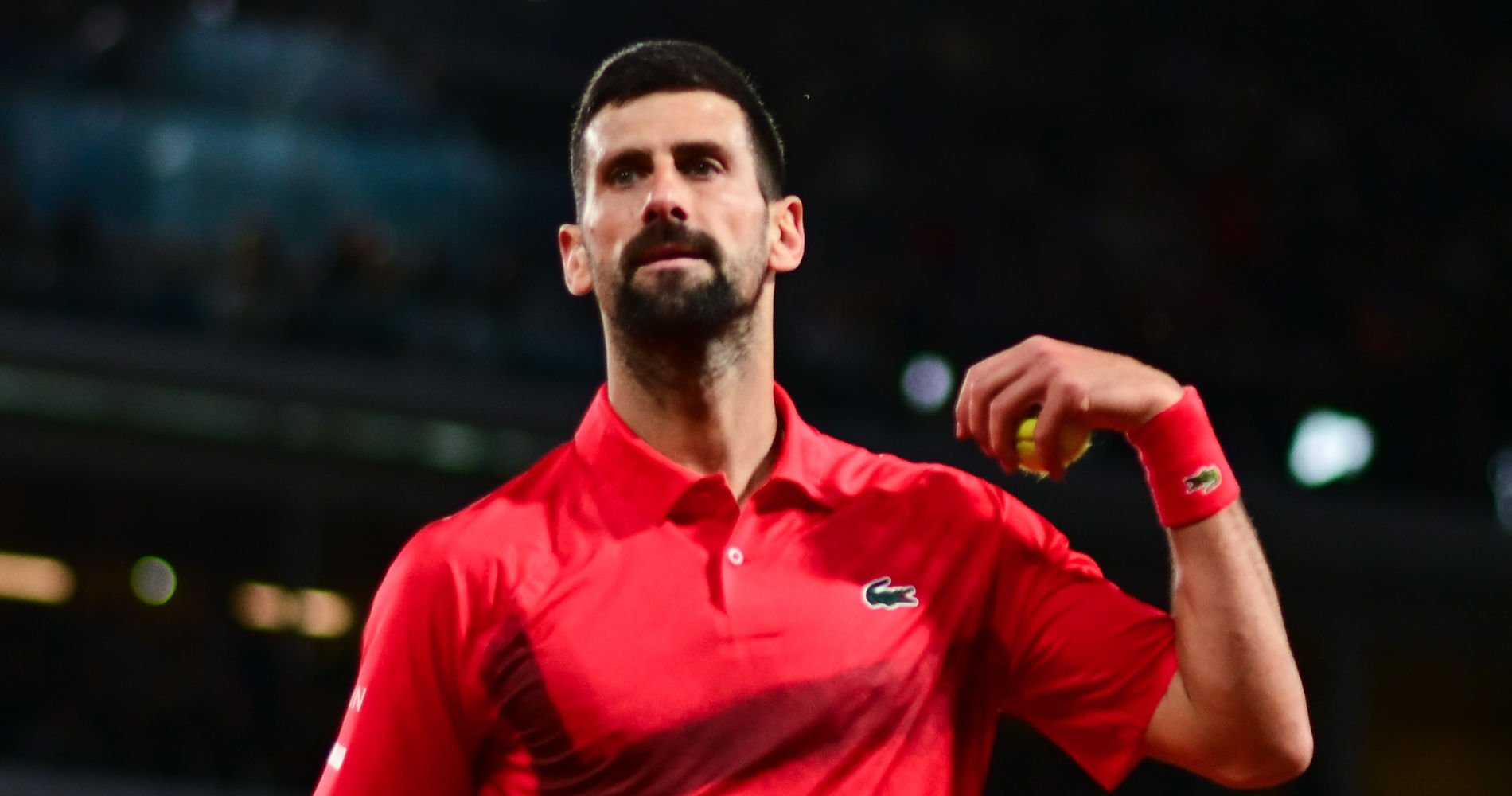
Tennis Majors: One could object that after all it’s only about ball games, a spectacle, and a passion for the people who play.
Francisca Dauzet: Obviously, here we are not talking about fundamental social issues but if we look closely, on a small scale, we find the anthropological and psychological ingredients of human behavior in the face of events. If I come back to high-level sport, it shows us in a zoom-like way how it directly confronts individuals with all kinds of stakes. There is of course the competition as such: everyone wants to win. But there is much more. There is money, a lot of money at stake in tennis. And of course there are a lot of psychic, emotional, mental stakes: “Succeeding in tennis, what does that mean for me?” It’s a mille-feuille with many layers. It cannot be smooth and reduced to the sport itself. It is the whole universe of the people that is staged. So when someone says to me: “Yes but there are still athletes who never show anything”. I am tempted to answer that we do not know how and why they act in this way, and above all at what price? And how, after the career, or outside the scene, does it turn against the athlete more or less in the long run. We see athletes fall seriously ill after their career for having kept all their extreme emotions inside themselves, whether psychically or physically, the two being linked. It’s a subject in itself, by the way 🙂
Tennis Majors: Do those who make these rules harm the interest of the sport and the athletes?
Francisca Dauzet: We can especially say that those who “lead” this sport, and make money with it, forget that they compress athletes in every way by demanding competitions nonstop. The latter are complaining about it more and more openly. The calendar is violent because tennis is a sport that never stops. Those who comment on tennis also know this. Male and female players can feel broken and burnt out but the business machine is there to call them to order regardless of the athletes’ state.
Would we therefore expect these competitors to be good little boys, good little girls who will give a lesson in good conduct in front of the cameras?
Tennis Majors: You are making the same observation as Corentin Moutet: when he loses his temper, the ATP gives him a huge fine. But the ATP validates the spectacle produced by putting the video on Instagram as fast as possible.
Francisca Dauzet: He recorded a song about it. He talks about that, he talks about how “everyone” profits, “everyone” puts you under pressure, “everyone” wants results, but in the end you are alone in your room to absorb that. (In Psychoanalysis, he sang in 2020: “Hypocrisy of our time. It sizzles on the microphone | Sacrifice of the human for the benefit of the harvest | It revolts me | But nothing to do”). A player is often alone to have to deal with all that. And the next day, to go back on the court and act as if nothing happened, to train as if nothing happened, while the pressure never stops. I recall Zverev’s comments on the subject not so long ago. Corentin knows what he’s talking about and what I’m saying is that the two things he describes are completely linked. When Corentin, Daniil, or Kyrgios make a buzz, they don’t do it to make a buzz, they do it because they are in difficulty. People will say to me: “They can work on it.” But they do work on it, for some! Simply their character, their genius, their way of being, which is not smooth, is a limit but also a lever – their lever – of performance that gives meaning, substance, soul to their quest.
Tennis Majors: Isn’t this precisely what people come to see in the stadium or on screens?
Francisca Dauzet: The people who come to the stadium also expect this, even if it is to be offended by it. We come to see who wins or loses, but we also come to see unexpected things that question, that allow us to transfer during a confrontation. A player who deviates from the imaginary norm with his emotions, that creates attention, that feeds the business. But what I want to say is that while everyone profits from this business in one way or another – for or against – enjoys the spectacle, the player himself is alone to endure this emotional pressure and have to assume it internally. And behind the emotions which are a visible manifestation, there is for each one a whole psychic and metaphorical universe that requires time to settle certain things and put them in balance.
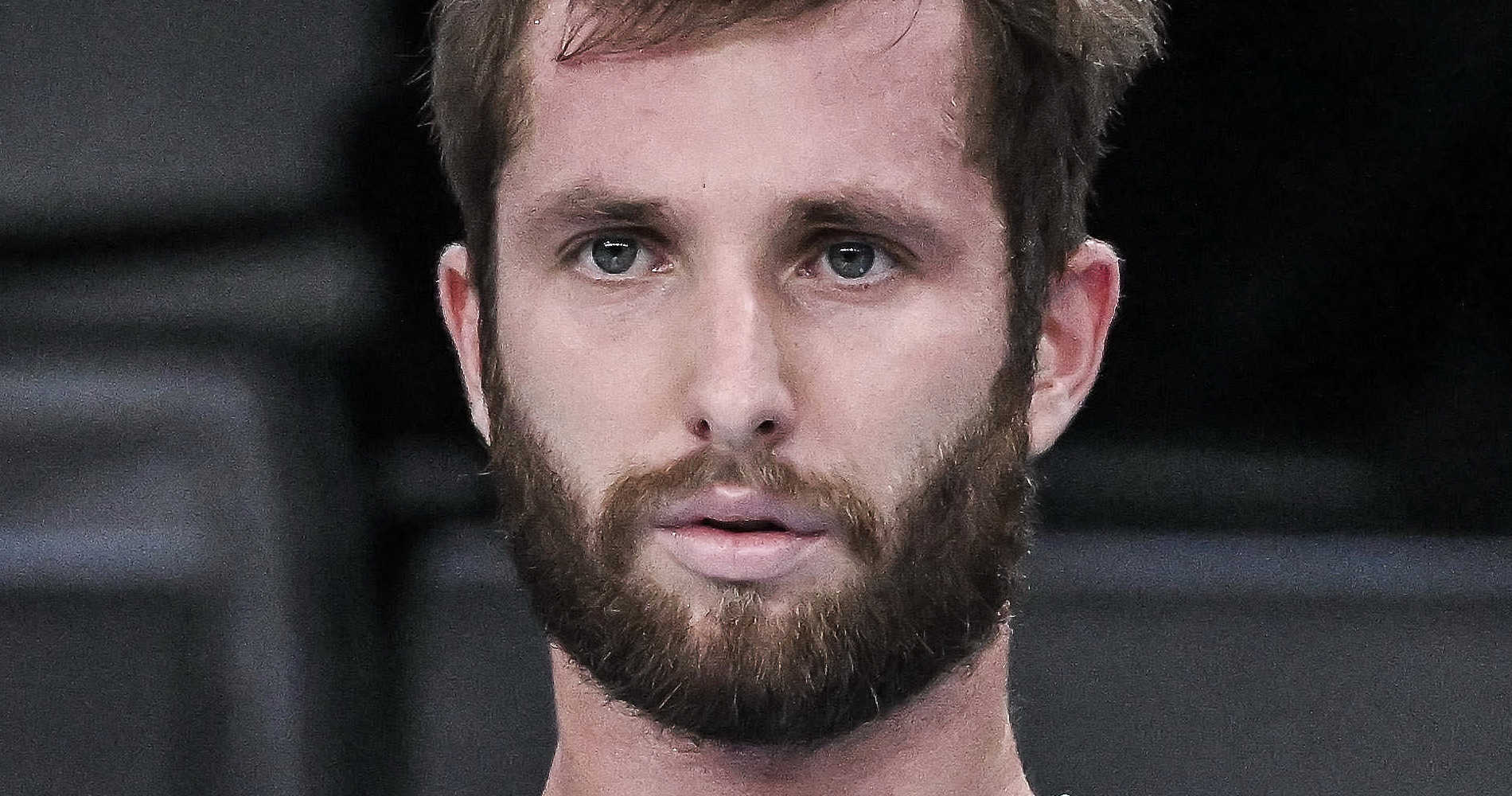
Tennis Majors: Does this observation justify, in your eyes, letting players break rackets?
Francisca Dauzet: I am not here to make sports regulations but my voice can be carried to inform the public about what happens inside a human being and a human being subjected to great tension. I happen to play tennis. You too. We can’t talk about an immoderate stake in our case and yet it happens to us that we want to break the racket. However, for them, it’s their life. For them, it’s a quest, a profession for some. Being a high-level athlete is not just a matter of being technically good. It’s an inner journey. Otherwise, what’s the point of making so many efforts? Do we want to see little men, like Playmobil, player A, player B, dehumanized, confronting each other as if they had no heart, no soul, no aspirations? Doesn’t the public come to see the opposite of that? They come to see athletes writing a story. And when people in the audience say “Go Daniil you’re right”, or “Daniil stop your circus”, or “Sinner is annoying for not showing emotion” or what do I know, it’s because they put something of themselves into it in terms of emotions and representations. They express it for the player. They express it for themselves too.
Tennis Majors: Are the athletes, closely or remotely, aware of this?
Francisca Dauzet: I think for many, no. It’s quite surprising that the head, the mind, the mental side are taken so little seriously and reflected upon when the desire that drives us is the engine of our actions. As if a human being were only a body that would have to obey in an automated way, without worrying about his head, that is to say the awareness of what he does, how and why? Not just the athlete either ☺ It’s even scary for many to still have to take care of their mind, their being who thinks and feels! Here too, it’s a subject in itself that I’ll do a next podcast about. To come back to those who find it great or scandalous that an athlete loses his temper, it would be good if they realized that there are stakes of suffering and the desire to get out of it that are expressed. What can be great is the way the player will turn the event that makes him suffer. The athlete has no other stake than this one at that moment: “How do I get out of this situation?” He takes what he finds, he is more or less brilliant, more or less adapted, more or less clean in his modalities, more or less mentally and psychologically equipped to face the situation, but he cannot be smooth, except in appearance. It’s neither great nor scandalous to do what he does, it’s just vital at that moment. Tennis is not just about balls being returned, it’s a mental force that is exchanged.
To come back to those who find it great or scandalous that an athlete loses his temper, it would be good if they realized that there are stakes of suffering and the desire to get out of it that are expressed.
Tennis Majors: When Daniil or Corentin decide to work on managing their emotions, because they do not want to be content with what happens to them, is it to be more successful or to take care of their image?
Francisca Dauzet: I cannot speak for them directly, but what I observe about this type of approach is that it is not for their image, except possibly at the request of a third party like a sponsor who is not happy or whatever, but it is especially and above all to stop the suffering or lessen it, and to seek paths to performance and internal health. It is not easy to live and build this. It is also a long inner journey of being’s evolution.
Tennis Majors: But if tomorrow, players with the temperament of Corentin or Daniil behave like Borg, it is a safe bet that everyone will find that suspicious and that it will not make them perform well. Does working on emotional stability mean succeeding in identifying the “moment” when deploying one’s way of being on the court leads to performance and well-being, and the moment when it tips into being overwhelmed and one enters a zone of suffering?
Francisca Dauzet: What is certain is that each personality has its singular path to performance. The work consists in favoring pleasure, a certain mental health to form a whole with the mental and sporting skills that allow performance. Sometimes, it is much more complex and in the ambivalence of being, there are paradoxical and unexpected levers, which worked on, favor for the athlete conditions of performance, despite his own asperities. And these levers are singular for each one. That is why, accompanying a person, an athlete, on this level requires being creative, soliciting his creativity and acting on the different singular dimensions of the person’s psyche and mind. For me, I add the energetic as a lever.
Tennis Majors: Does this mean that the culture of tennis, of self-control, of good manners, provided for by the code of conduct, is more favorable to certain cultures than to others?
Francisca Dauzet: On certain aspects, we can say that. As for the expression of emotions or social interaction from a cultural point of view, it is true that if you walk in London and if you walk in Paris, it is not quite the same energy. If you walk in Sweden, Norway or if you walk in Italy, Spain or the South of France, it’s not quite the same either. However, what we notice is that each player, whatever his culture, finds a way to perform. So…
How were all these athletes built as athletes but first as people? And above all, there is a mythology of the stories we tell ourselves or that are told: the crossings of these mythologies are found at all crossroads of our lives and on a court in a match. All very high-level athletes also have this same kind of problem despite their success. They have to deal with the slogans: what was said about them, what was not said about them, the comparisons, the inner and family and cultural dictates: all of this exists very strongly in them. As in everyone else.
Tennis Majors: You say that athletes do not work on their emotional stability for their image, but I remember Daniil, or in another context Andrey Rublev, saying that they no longer wanted to see themselves like that and that they were going to “give” us in the media fewer scenes of this type. However, they started again. That makes me think of the mechanics of New Year’s resolutions: “I’m getting back into sport”, “I’m stopping drinking”. What does that say about the lack of effectiveness of everyone’s best will?
Francisca Dauzet: We therefore see that it is not so easy to put into practice the awareness one can have of the events of which one is the actor. There is a dichotomy that we all encounter in our lives and which takes time to transform. Deconstructing and building requires significant work. However, all people who gradually transform their behavior and their deep functioning need time and training.
Francisca Dauzet: To transform oneself, it takes much more than a declaration. It requires work on oneself, and a repetition of efforts. You have to have the ability to observe what you do (and therefore also acquire this ability), to understand why you do it, to identify what is happening. Saying “I’m green, I want to become blue”, that requires going through intermediate shades that are not very clear which, at some point, will look like an acceptable blue. It is long and requires patience. If the work of transformation does not happen, it is because perhaps the deep desire, the deep motivation have not been truly brought into consciousness or well adjusted to the principle of reality of what is achievable. Why “would I want” to do more sport from January 1st? To do what? To look like my super muscular neighbor or for myself? Is it a superficial, circumstantial or structural motivation? For myself, my health, my balance: how did I think about this resolution? If the desire is not properly updated, nothing will happen. I would add, in the specific case of athletes, that high-level training is not really ideal for the health and balance of a human, neither physically nor mentally. It’s out of the ordinary. It consists of pushing the machine as far as possible, with perhaps a price to pay later. The body and mind are put to the test. Permanent training, the fact of always going to competitions, of always starting over with the same thing, requires knowing how to find drive, dynamism, joy, motivation to nourish one’s inner quest in this way, always and again. How many players have said, recently, that the schedules were crazy? That they were exhausted. Why always push further? In this context, out of a hundred people around us, how many have never behaved excessively in the face of repetitive constraints or situations without them being pointed out?
In any case, the speech “Me, I control my emotions. No big deal! etc.” does not correspond to reality. Someone who claims this is precisely someone who puts a foot on it so as not to have to live and welcome them.
Tennis Majors: No one, probably.
Francisca Dauzet: Exactly. That’s why I say that, when we make a judgment in one direction or another, we are judging ourselves. The type of unconscious reasoning at work would be: “What he is doing there, I forbid myself, so why would others have this right?” Or. “I control myself all the time. So why would someone else not do it?”. Or again: “I hate seeing him do it, but in truth, I would like to do it in my life.” In any case, the speech “Me, I control my emotions. No big deal! etc.” does not correspond to reality. Someone who claims this is precisely someone who puts a foot on it so as not to have to live and welcome them. Out of fear most often. When people behave with excess or virulence in one direction or another when watching sports, it puts them in the mirror of their own restriction, their own inner anger. We think about ourselves, we talk about ourselves.
Tennis Majors: Because “The Show Must Go on”.
Francisca Dauzet: That’s right! This questions those who set the rules. Are they not the first abusers? “You players, you must respect all your commitments, and what’s more, be perfect in your behavior. Whatever the efforts, whatever the mess, we don’t want to know: break your backs every day but fit into the framework, and no emotional states.” And what about the other actors who participate in the show?
Tennis Majors: The authorities, notably the WTA, and certain tournaments, are communicating about taking mental health issues into account and making resources available to players.
Francisca Dauzet: I observe that some Grand Slams like the US Open and Roland-Garros, make psychological support available to athletes, yes. I don’t know if this support is often requested. But we can consider that this kind of device can help relieve a player at the moment and/or serve as a lever for a work to be started behind with a professional. But it’s a bit schizophrenic all the same since the complex system of competitions and the sports market favors on one side the malaise (as the players themselves say).
Tennis Majors: Are you telling us that if the public had access to the trials and troubles that the players go through, it would comment less uninhibitedly?
Francisca Dauzet: Many athletes are in very bad psychological condition sometimes because of what is said about them, but most often because of what high-level sport demands of them and the atmospheres in which they evolve. It’s also the reflection of this society of the spectacle. What happened with Daniil about his behavior and the comments that followed, it’s just a part of the system, the story we tell ourselves, the mythology we create. Because what would have been said if Daniil had won? We would want gladiators who land in the lion’s den without feelings, without emotions. When he turns out to be violent on the field, the high-level athlete is not looking for this violence. He just expresses an internal anger, he is not mad at the whole world. Athletes in general do not insult anyone, if anything, they insult themselves by default. They defend themselves against what they feel is unjust, or the powerlessness they experience, rightly or wrongly. The energy they mobilize to get out of a situation is the same energy that can turn against them. That’s it. And it’s just human. It’s just human because no one is perfect, none of us. Don’t some of those who comment tend to forget that?





